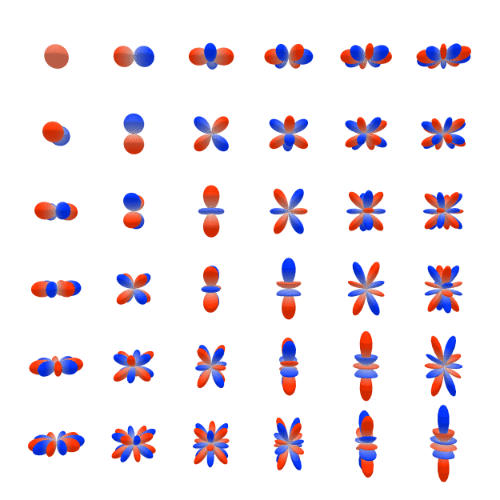Equivariant convolutional neural networks for the group E(3) of 3 dimensional rotations, translations, and mirrors.
Project description
e3nn
E(3) is the Euclidean group in dimension 3. That is the group of rotations, translations and mirror.
e3nn is a pytorch library that aims to create E(3) equivariant neural networks.
Example
from functools import partial
import torch
from e3nn.non_linearities.rescaled_act import swish
from e3nn.radial import GaussianRadialModel
from e3nn.kernel import Kernel
from e3nn.point.operations import Convolution
from e3nn.non_linearities.norm import Norm
from e3nn import rs
# Define the input and output representations
Rs_in = [(1, 0), (2, 1)] # Input = One scalar plus two vectors
Rs_out = [(1, 1)] # Output = One single vector
# Radial model: R+ -> R^d
RadialModel = partial(GaussianRadialModel, max_radius=3.0, number_of_basis=3, h=100, L=1, act=swish)
# kernel: composed on a radial part that contains the learned parameters
# and an angular part given by the spherical hamonics and the Clebsch-Gordan coefficients
K = partial(Kernel, RadialModel=RadialModel, normalization='norm')
# Use the kernel to define a convolution operation
C = partial(Convolution, K)
# Create the convolution module
conv = C(Rs_in, Rs_out)
# Module to compute the norm of each irreducible component
norm = Norm(Rs_out, normalization='norm')
n = 5 # number of input points
features = rs.randn(1, n, Rs_in, normalization='norm', requires_grad=True)
in_geometry = torch.randn(1, n, 3)
out_geometry = torch.zeros(1, 1, 3) # One point at the origin
norm(conv(features, in_geometry, out_geometry)).backward()
print(features)
print(features.grad)
Hierarchy
e3nncontains the librarye3nn/o3.pyO(3) irreducible representationse3nn/rsh.pyreal spherical harmonicse3nn/rs.pygeometrical tensor representationse3nn/imagecontains voxels linear operationse3nn/pointcontains points linear operationse3nn/non_linearitiesnon linearities operations
examplessimple scripts and experiments
Installation
pip install git+https://github.com/e3nn/e3nn
To get the CUDA kernels read the instructions in INSTALL.md.
Citing
@software{e3nn_2020_3723557,
author = {Mario Geiger and
Tess Smidt and
Benjamin K. Miller and
Wouter Boomsma and
Kostiantyn Lapchevskyi and
Maurice Weiler and
Michał Tyszkiewicz and
Jes Frellsen},
title = {github.com/e3nn/e3nn},
month = mar,
year = 2020,
publisher = {Zenodo},
version = {v0.3-alpha},
doi = {10.5281/zenodo.3723557},
url = {https://doi.org/10.5281/zenodo.3723557}
}
Project details
Release history Release notifications | RSS feed
Download files
Download the file for your platform. If you're not sure which to choose, learn more about installing packages.
Source Distribution
Built Distribution
Filter files by name, interpreter, ABI, and platform.
If you're not sure about the file name format, learn more about wheel file names.
Copy a direct link to the current filters
File details
Details for the file e3nn-0.0.0.tar.gz.
File metadata
- Download URL: e3nn-0.0.0.tar.gz
- Upload date:
- Size: 607.5 kB
- Tags: Source
- Uploaded using Trusted Publishing? No
- Uploaded via: twine/3.1.1 pkginfo/1.5.0.1 requests/2.23.0 setuptools/41.2.0 requests-toolbelt/0.9.1 tqdm/4.46.0 CPython/3.8.3
File hashes
| Algorithm | Hash digest | |
|---|---|---|
| SHA256 |
f86909a2fdeee807024791258de13e7e8a8411fb0d489cc8f5519b3483aaea17
|
|
| MD5 |
04c6049735a5c35411ca91ae5be30da4
|
|
| BLAKE2b-256 |
0d002fce38a34891b8ce5a95905b8cac955bc168e7d7cf4d57a1456a5b29964b
|
File details
Details for the file e3nn-0.0.0-py3-none-any.whl.
File metadata
- Download URL: e3nn-0.0.0-py3-none-any.whl
- Upload date:
- Size: 701.7 kB
- Tags: Python 3
- Uploaded using Trusted Publishing? No
- Uploaded via: twine/3.1.1 pkginfo/1.5.0.1 requests/2.23.0 setuptools/41.2.0 requests-toolbelt/0.9.1 tqdm/4.46.0 CPython/3.8.3
File hashes
| Algorithm | Hash digest | |
|---|---|---|
| SHA256 |
0a84b301f065ad371d608ce71d7ffde8bfdee7df9d3d3a532fa858f03b8d7e93
|
|
| MD5 |
4a0e05168c8c6572eba2751544e51a46
|
|
| BLAKE2b-256 |
ed3441ec81a75d116c5ccd327a8dade0f3fe114b78c6841001fcf030cd1b901f
|














